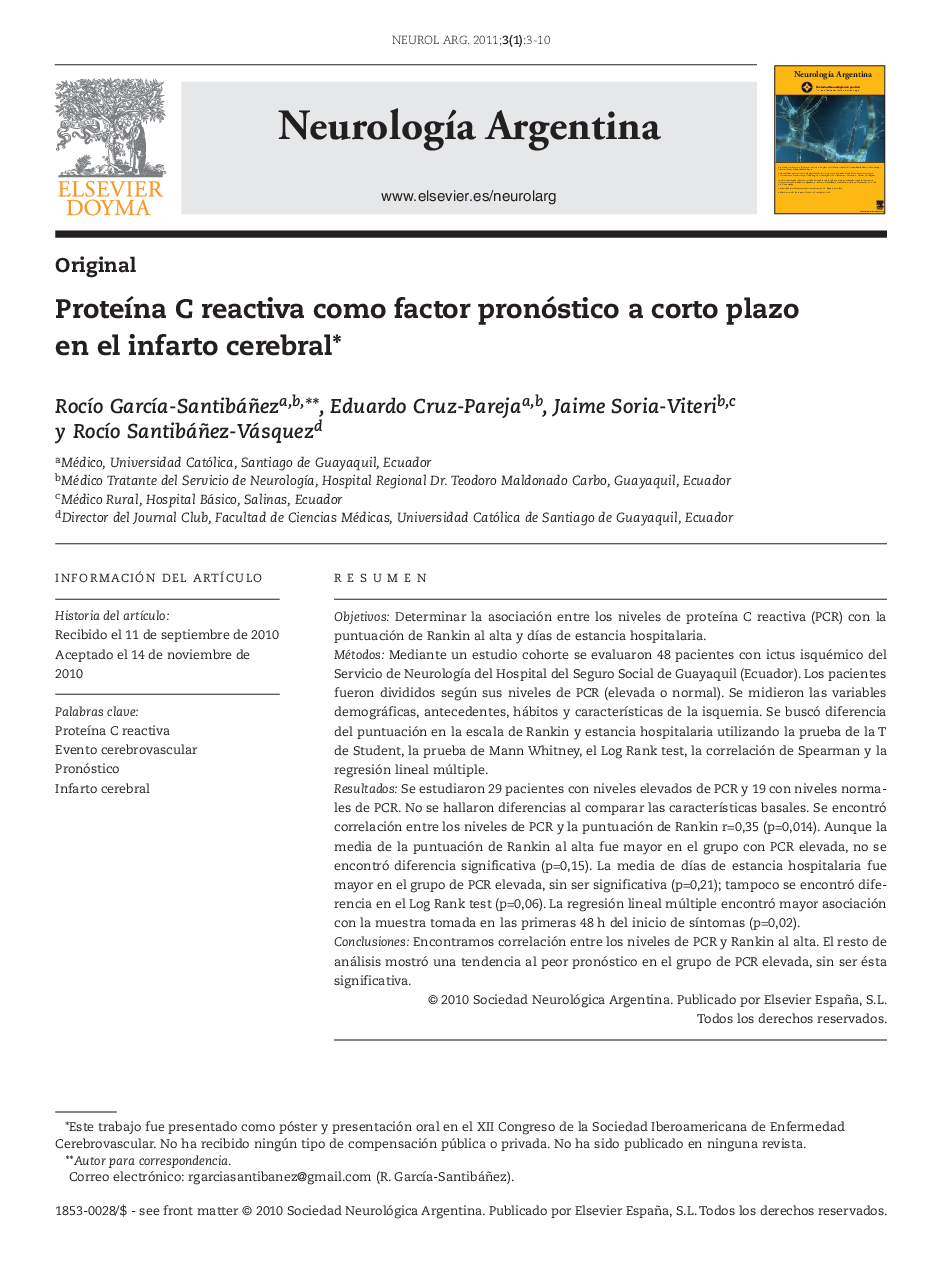| Article ID | Journal | Published Year | Pages | File Type |
|---|---|---|---|---|
| 3076753 | Neurología Argentina | 2011 | 8 Pages |
ResumenObjetivosDeterminar la asociación entre los niveles de proteína C reactiva (PCR) con la puntuación de Rankin al alta y días de estancia hospitalaria.MétodosMediante un estudio cohorte se evaluaron 48 pacientes con ictus isquémico del Servicio de Neurología del Hospital del Seguro Social de Guayaquil (Ecuador). Los pacientes fueron divididos según sus niveles de PCR (elevada o normal). Se midieron las variables demográficas, antecedentes, hábitos y características de la isquemia. Se buscó diferencia del puntuación en la escala de Rankin y estancia hospitalaria utilizando la prueba de la T de Student, la prueba de Mann Whitney, el Log Rank test, la correlación de Spearman y la regresión lineal múltiple.ResultadosSe estudiaron 29 pacientes con niveles elevados de PCR y 19 con niveles normales de PCR. No se hallaron diferencias al comparar las características basales. Se encontró correlación entre los niveles de PCR y la puntuación de Rankin r=0,35 (p=0,014). Aunque la media de la puntuación de Rankin al alta fue mayor en el grupo con PCR elevada, no se encontró diferencia significativa (p=0,15). La media de días de estancia hospitalaria fue mayor en el grupo de PCR elevada, sin ser significativa (p=0,21); tampoco se encontró diferencia en el Log Rank test (p=0,06). La regresión lineal múltiple encontró mayor asociación con la muestra tomada en las primeras 48 h del inicio de síntomas (p=0,02).ConclusionesEncontramos correlación entre los niveles de PCR y Rankin al alta. El resto de análisis mostró una tendencia al peor pronóstico en el grupo de PCR elevada, sin ser ésta significativa.
ObjectiveDetermine the association between C-Reactive Protein (CRP), the Rankin scale score at discharge and the hospital stay days.MethodsCohort study of 48 patients with diagnosis of ischemic stroke admitted to the Neurology Service of the Social Security Hospital, Guayaquil-Ecuador. Patients were divided into two groups depending of their CRP levels (normal or elevated). Demographic variables, medical history, social history and stroke characteristics were accounted. The difference between the Rankin scale score and the hospital stay days was determined by the T test, Mann Whitney test, Log Rank test, Spearman correlation and multiple linear regression.ResultsTwenty nine patients with elevated CRP levels and 19 with normal CRP levels were studied. Both groups had similar baseline characteristics. We found a correlation between the CRP levels and the Rankin scale score r=0.35 (p=0.014). Even though the mean of the Rankin scale score was higher in the elevated CRP group there was no significant difference (p=0.15). The mean of the hospital stay days was higher in the elevated CRP group with no difference (p=0.21) and no difference was found with the Log Rank test (0.06) either. The multiple lineal regression found a stronger association with the samples taken in the first 48 h of the beginning of symptoms (p=0.02).ConclusionWe found a correlation between the levels of CRP and Rankin scale score at discharge. The remaining analysis showed a tendency for worse prognosis in the elevated CRP group not statistically significant.
